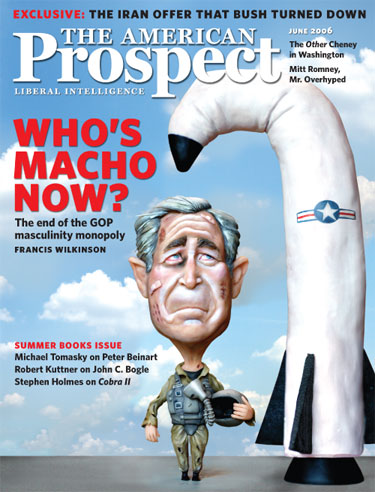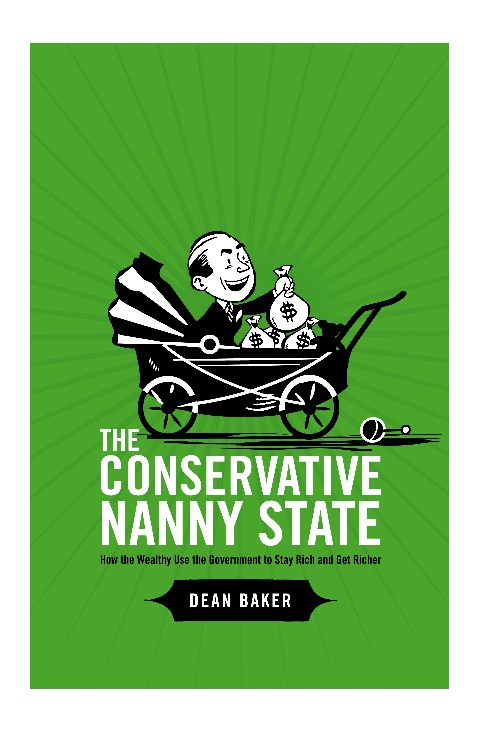Archive: May 2006
Freedom Fries
May 22, 2006

The June 2006 issue of The American Prospect includes an abridged version of the piece David Howell and I wrote on the French student revolt against proposed labor-market reforms there.
Unfortunately, you have to subscribe to TAP to read the full piece online.
Who's on First?
May 21, 2006
The days and weeks after the 2004 election saw a tremendous transformation in the Bush presidency. After four years of doing exactly what he was told, President Bush suddenly got it in his mind that he was the reason that he had won a second term. After four years of giving every impression of being a deeply insecure man, suddenly he started acting like he was in charge. He had "earned... political capital" and he was going to spend it.
The results, of course, have been disastrous for the President, his administration, and his "legacy." The people who ran the political and policy operation the first four years --some combination of Dick Cheney and Karl Rove-- would, for example, never have let training-wheels W nominate Harriet Myers, or stay on vacation while New Orleans drowned, or approve the Dubai port deal, among other bad political decisions the president made or allowed to happen after the big win.
For me, the Harriet Myers fiasco was the most egregious case, because it was so obviously personal and, as a result, so completely arrogant. Imagine, for example, what Fox News would have said if President Clinton decided to nominate his personal attorney from Arkansas to be on the Supreme Court. No one thought to mention to the President how that might look?
In the last week, however, the Bush presidency may be starting to turn itself around. The incredibly unlikely issue of immigration seems to have given the President a chance to revert to the more successful strategy of his first term, where other people told him what to do and say.
Immigration is one of the very few issues where George Bush breaks with his cultural-conservative base. On the economics, he wants a guest-worker program to keep a steady flow of cheap workers with restricted legal rights and limited economic expectations available for his corporate funders. On the cultural front, he really does seem to believe that immigrants invigorate and enrich America, even if most of his base sees immigrants as a direct assault on their way of life.
So, to save his presidency, Bush had to look outside himself to come up with a sellable immigration policy. And someone stepped in and told him what to say. I don't think what he proposed was particularly coherent, but I am sure it polled well: send in the National Guard, denounce amnesty, sound compassionate, yet tough. (Here's a transcript of the speech.)
This raises an important question that goes well beyond the immigration debate. Who is calling the shots now? If the President has conceded that he's made a mess of things, who did he let in to clean it up? Rove, by most accounts, is occupied elsewhere. And the triangulation strategy implicit in the immigration speech was about as un-Rovian a line as could possibly be imagined. It could be Cheney, but the papers and blogs are full of accounts of his increasing distance from the President, power, and even reality.
Anyway, my guess is that the administration's new political strategy just might turn things around. W is looking presidential, decisive, and if any kind of immigration deal comes out of it, he'll suddenly look like a uniter, not a divider. In the meantime, if someone new is running the White House, I'd like to know who it is.
Vanderbilt in France
May 18, 2006

David Howell and I were both pretty unhappy with the coverage in the US press of recent demonstrations by French students and workers. Most of France opposed the proposed new changes to French labor law that would have significantly reduced job security for workers under the age of 26. What really bothered us was the knee-jerk reaction in the US press, which is generally pretty ignorant of France and the French economy.
We're not experts on France, but we did take the time to look at a few numbers. We summarized some key facts missing from the debate in a short piece you can download from the Schwartz Center for Economic Policy Analysis at the New School.
Among the things you didn't read in the New York Times and the Washington Post: almost the same exact share of young people are unemployed in the United States and France (if they have a crisis, so do we); more French youth (under 26) are enrolled in school than US youth of the same age --that's a good thing; and, my personal favorite, during George Bush's first term in office, employment grew at a faster rate in France than it did in the United States.
Baker Blog
May 18, 2006

After a decade writing his weekly "Economic Reporting Review", which analyzed economics coverage in the New York Times and the Washington Post, Dean Baker has decided to convert ERR into a daily blog. You can read Dean's commentary at "Beat the Press" --and even comment on Dean's comments, if you'd like.
Nanny State
May 18, 2006

My friend and CEPR colleague, Dean Baker, has just written and published a great book: The Conservative Nanny State: How the Wealthy Use the Government to Stay Rich and Get Richer. I say "published" because Dean and CEPR are distributing his work as an e-book. You can download a free pdf copy, or read the complete book online in html format, at the book's web site: www.conservativenannystate.org.
If you really want a copy in paperback, you can buy one from Lulu, the innovative online publisher that prints books on demand. The price is an unbelievably inexpensive $6.91 plus shipping and handling.